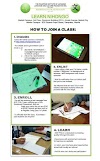Selecciones literarias
Gramática
Repaso de los tiempos verbales
(Review of verb tenses)
(Review of verb tenses)
| In units 1-4, we reviewed most of the verb forms and tenses commonly used in Spanish; this is simply a summary of all of those forms.
1. Forms of the INDICATIVE
PRESENT
PRETERITE
IMPERFECT
FUTURE
CONDITIONAL
2. Forms of the SUBJUNCTIVE
PRESENT SUBJUNCTIVE
IMPERFECT SUBJUNCTIVE
| ||||||||||||||||||||||||||||||||||||||||||||||||||||||||||||||||||||||||||||||||||||||||||||||||||||||||||||||||||||||||||||||||||
La secuencia de tiempos
(Sequence of tenses)
(Sequence of tenses)
| In both Spanish and English, there are rules for what tenses can be used together in complex sentences (i.e. sentences with more than one clause); one example of this are the cláusulas con 'si' from the last unit; in English it we can say "If I study, I will get a good grade" or "If I studied, I would get a good grade", but notice that it sounds strange to mix up those tenses, so What's maybe a bit more complicated in Spanish is that one has the subjunctive to contend with, and there are certain rules for which tense of the subjunctive to use in which type of sentence. The basic rule for sentences containing a verb in the subjunctive is, if the first part of the sentence is in the present or the future, then the clause with the subjunctive should also be in the present. If, on the other hand, the first part of the sentence is in the past, then the clause with the subjunctive should be in the past. We saw this already in Unit 3. Notice the tense of the subjunctive in these two examples:
Queremos que[Susana nos visite]
Main verb = present, subjunctive = present]
Queríamos que [Susana nos visitara]
We can basically divide all of the verb tenses in Spanish into two categories, present and past - when one of the tenses that belongs to the "present" category is used in the main clause of a sentence, then the present subjunctive is used in the subordinate clause. The verb tenses that belong to the "present" category are:Main verb = past (imperfect), subjunctive = past
present (quiero, quieres, quiere)
With any of these verb forms, then, we use the present subjunctive:future (querré, querrás, querrá) command (quiere, quiera) present perfect (he querido, has querido, ha querido) Espero que vayas. Esperaremos hasta que tengas tiempo. No esperes que te den un trabajo sin una entrevista. Siempre han esperado que se les solucione todo sin tener que hacer nada. The verb tenses that belong in the past category are: preterite (quise, quisiste, quiso) imperfect (quería, querías, quería) conditional (querría, querrías, querría) pluperfect (había querido, habías querido, había querido) Te esperé para que pudiéramos hablar de este asunto. Esperaba que fueras al cine conmigo. Esperarían hasta que tuvieras tiempo. Siempre habían esperado que se les solucionara todo. |







0 Comments